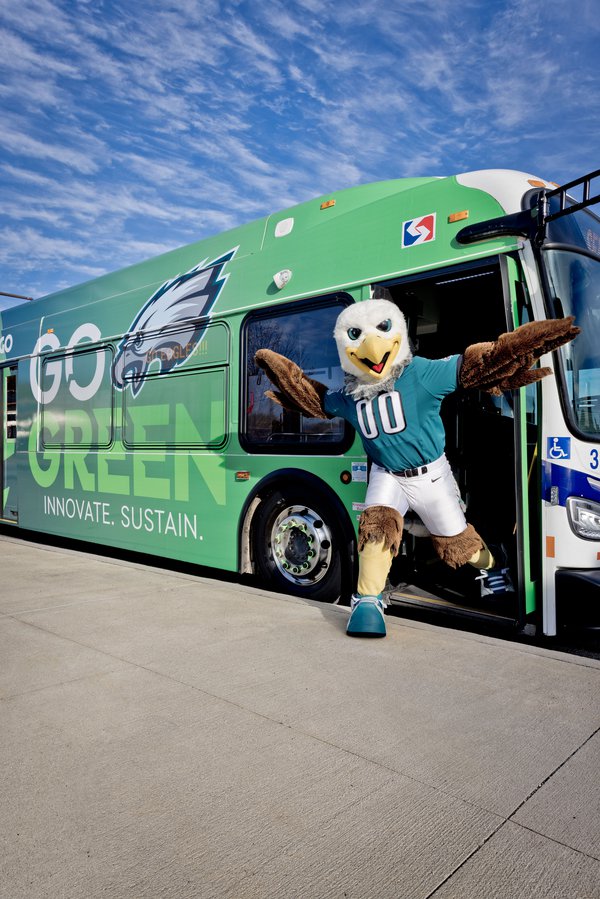The Philadelphia Eagles are synonymous with the color green. Now, the team is asking fans to go green to help save the planet.
On Thursday, the Birds announced a partnership with SEPTA, aimed at reducing the carbon footprint of Philadelphia by encouraging residents to use public transportation.
- MORE NEWS
- Eagles add two reverse vending machines to incentivize recycling at the Linc
- Protestors claim N.J. wind farm project is killing whales, but a marine scientist says that's 'unlikely'
- At the Philly airport, travelers can see zoo animals – like Bili the lizard
"There are many benefits that come with taking public transit," Norman Vossschulte, director of fan experience and sustainability for the team, said. "Not only does it reduce CO2 emissions in the atmosphere, it helps to conserve energy, lowers our dependency on fossil fuel and decreases congestion on the road."
To raise awareness, SEPTA will begin deploying buses wrapped in green with the Eagles logo and the messaging, "Go Green. Innovate. Sustain," on the sides and "Reduce Congestion. Ride the Bus. Improve Air Quality," on the back.
A carbon footprint refers to the amount of greenhouse gas emissions generated by individual or collective actions. High emissions of these gases, which include carbon dioxide and methane, have a negative impact on the environment, worsening climate change and air pollution.
The EPA reports that 27% of U.S. greenhouse gas emissions come from transportation
"Choosing to ride public transportation over single-occupancy vehicles is one of the most effective ways to reduce greenhouse gas emissions," SEPTA CEO Leslie S. Richards said. "Riding the bus, train or trolley just one time this week can help lower the world's greenhouse gas emissions, which not only slows climate change, it also cuts down on traffic and improves air quality."
According to the UCLA, each vehicle on the road releases roughly a pound of carbon dioxide per mile driven, but using public transit can reduce CO2 emissions by 45%. Researchers estimate that public transportation reduces the amount of carbon dioxide emissions in the United States annually by 37 million metric tons.
In Philadelphia, data from the greenhouse gas inventory shows that transportation emissions have increased by 5% since 2006 because of the number of miles traveled, which may be linked to increases in the population of the city.
This week, the Inrix Global Scorecard ranked Philly as one of the most traffic-congested cities in the world. The study found that Philadelphia drivers spent 114 hours in traffic last year, which contributed to $1,925 in lost money due to the rising cost of gas.
The Eagles have committed to environmental programs through the "Eagles Go Green" program. The team's stadium, Lincoln Financial Field, uses 100% green energy and has 11,000 solar panels and 14 wind turbines.
Last summer, the team joined forces with Bellwether District to invest in community cleanups. For every touchdown scored, money was donated to a location in the city for a cleanup event.
In October, the Eagles introduced two reverse vending machines in the stadium to entice people to recycle during games. Fans who use the machines can win prizes such as autographed items and tickets to the home opener next season.

